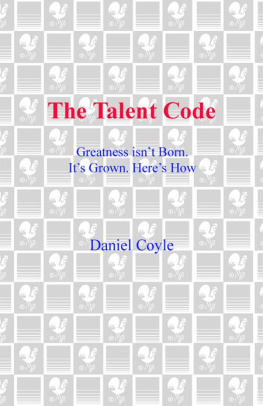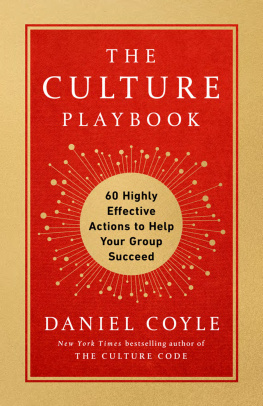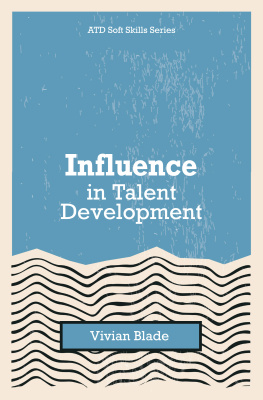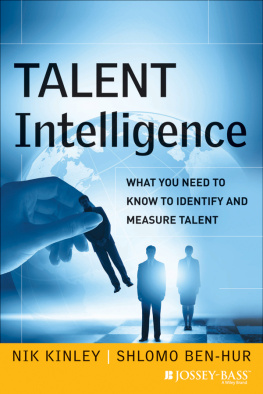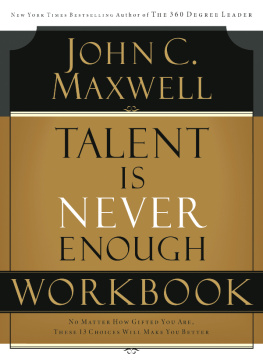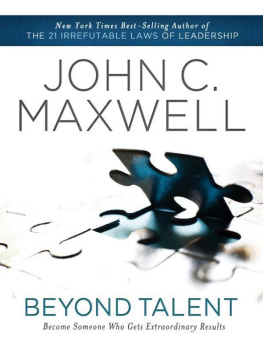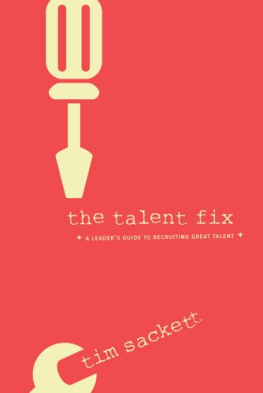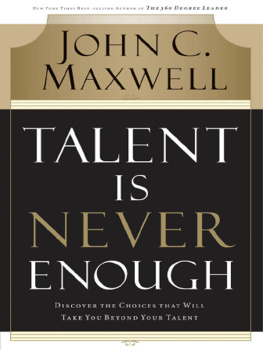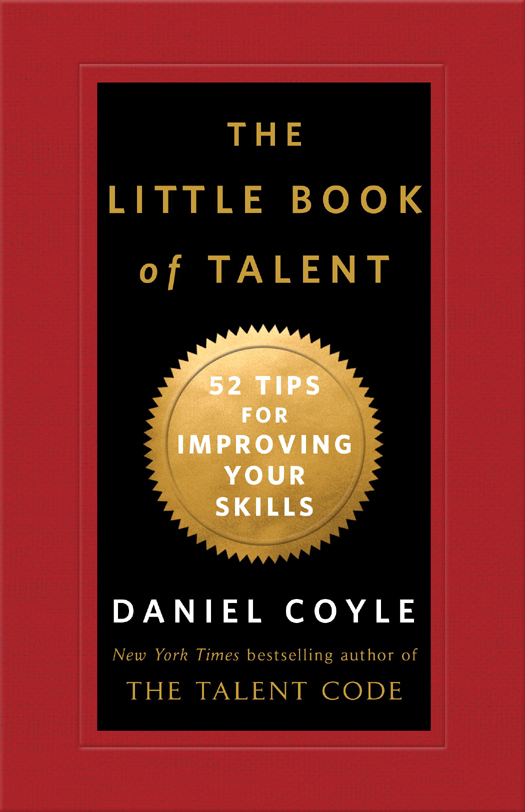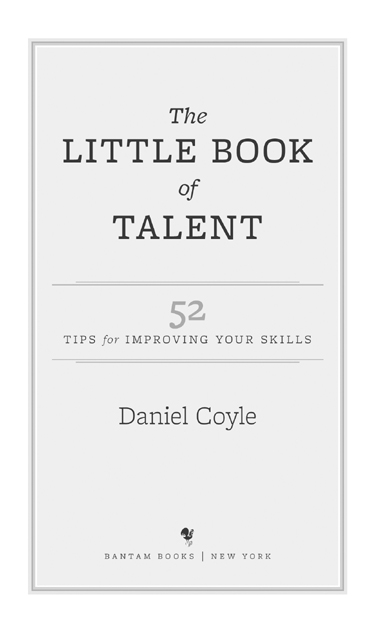The Little Book of Talent is a work of nonfiction.
Some names and identifying details have been changed.
Copyright 2012 by Daniel Coyle
All rights reserved.
Published in the United States by Bantam Books, an imprint of The Random House Publishing Group, a division of Random House, Inc., New York.
Bantam Books and the rooster colophon are registered trademarks of Random House, Inc.
LIBRARY OF CONGRESS
CATALOGING-IN-PUBLICATION DATA
Coyle, Daniel.
The little book of talent : 52 tips for improving skills / Daniel Coyle.
p. cm.
eISBN: 978-0-345-53669-3
1. Ability. I. Title.
BF431.C685 2012
153.9dc23
2012001646
www.bantamdell.com
Case design: Tom McKeveny
v3.1
We are what we repeatedly do.
Excellence, then, is not an act, but a habit.
A RISTOTLE
CONTENTS
PART ONE: GETTING STARTED
Stare, Steal, and Be Willing to Be Stupid
PART TWO: IMPROVING SKILLS
Find the Sweet Spot, Then Reach
PART THREE: SUSTAINING PROGRESS
Embrace Repetition, Cultivate Grit, and Keep Big Goals Secret
INTRODUCTION
The Story of the Little Book
A few years back, on assignment for a magazine, I began visiting talent hotbeds: tiny places that produce large numbers of world-class performers in sports, art, music, business, math, and other disciplines. Places such as:
A ramshackle Moscow tennis club that had, over the previous three years, produced more Top 20 women players than the entire United States.
A humble Adirondacks music camp where students accomplish one years worth of progress in seven weeks.
A San Mateo, California, inner-city charter school that, in four years, transformed a student population perennially ranked at the bottom of state math scores into one that scored in the ninety-sixth percentile.
A Dallas vocal studio that has, over the past decade, developed millions of dollars worth of pop-music talent.
A ski academy in Vermont with an enrollment of a hundred that has produced fifty Olympic skiers over the past forty years.
My research also took me to a different sort of hotbed: the laboratories and research centers around the country investigating the new science of talent development. For centuries, people have instinctively assumed that talent is largely innate, a gift given out at birth. But now, thanks to the work of a wide-ranging team of scientists, including Dr. K. Anders Ericsson, Dr. Douglas Fields, and Dr. Robert Bjork, the old beliefs about talent are being overturned. In their place, a new view is being established, one in which talent is determined far less by our genes and far more by our actions: specifically, the combination of intensive practice and motivation that produces brain growth.succeed by aligning themselves with the brains natural mechanisms for acquiring skill.
Along the way, however, the journey had an unexpected side effect. Besides being a journalist, I happen to be the father of four, a volunteer baseball coach, and the husband of a hockey-playing wife. As a family, we struggled daily with the usual questions and anxieties that revolve around the process of acquiring and developing skills. How do we help our daughter learn her multiplication tables? How do we tell a genuine talent from a momentary interest? Whats the best way to spark motivation? How do we encourage improvement without becoming psycho parents or creating stressed, unhappy kids? As it turned out, visiting these remarkable places was not just a chance for me to be a journalist. It was also a chance to become a better coach and a better dad.
It started when I visited my first talent hotbed, the Spartak Tennis Club in Moscow. On my first morning there, I walked in to see a line of players swinging their racquets in slow motion, without the ball, as a teacher made small, precise adjustments to their form. I noticed the way the teachers routinely mixed age groups. I noticed the riveted, laserlike looks in the younger players eyes as they watched the older stars, as if they were burning images of perfect forehands and backhands onto their brains. In my brain, a thought began to take shape.
I could really use this stuff back home.
From that point on, whenever I spotted a nugget of advice or a potentially useful method, I jotted it in my notebook and marked the page with an electric-pink Post-it. I scribbled down tips like Always exaggerate new moves; Shrink the practice space; and (my personal favorite) Take lots of naps. Over the course of the year, a forest of pink grew along the edges of my notebook.
The advice turned out to work wellquite well, judging by the swift, steady progress of my kids violin and piano playing, my wifes hockey skills, and the win-loss record of the Little League team I coached (10-3; the all-star team I coached, which had historically done poorly, nearly advanced to regionals). After The Talent Code was published, I began hearing from groups that were using the principles of the book to create talentdevelopment programs of their owna charter school in Maine, a nursing program in Minnesota, a golf academy in Florida, an SAT-prep course in California, a Division I college basketball team, a software company, military special-ops training organizations, and several professional sports teams. I kept traveling, visiting more talent hotbeds, talking to more master teachers, and adding more pink Post-its. At some point I realized that I needed to organize all this advice and put it in one place.
This book is that place.
What follows is a collection of simple, practical tips for improving skills, taken directly from the hotbeds I visited and the scientists who research them. The advice is field-tested, scientifically sound, and, most important, concise. Because when it comes down to it, were all navigating busy, complex lives. Parent or teacher, kid or coach, artist or entrepreneur, we all want to make the most of our time and energy. When it comes to developing our talents, we could use an owners manual, something to say Do this, not that. We could use a master coach that tucks in our pocket. We could use a little book.
How to Use This Book
Lets start with the basics:
1. We all possess talents.
2. Were unsure how to develop those talents to their full potential.
For most of us, the problem revolves around one word: how. How do we recognize talents in ourselves and in those near us? How do we nurture talent in its early stages? How do we gain the most progress in the least time? How do we choose between different strategies, teachers, and methods?
This book is built on the idea that the best way to develop your talents is to follow the proven techniques of the talent hotbeds. The tips Ive collected fall into three natural categories, which form the sections of this book:


